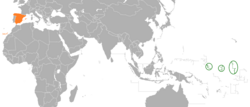
Kiribati is a full member of the Commonwealth, the IMF and the World Bank, and became a full member of the United Nations in 1999. Kiribati hosted the Thirty-First Pacific Islands Forum in October 2000. Kiribati has Least Developed Country Status and its interests rarely extend beyond the region. Through accession to the Lomé Convention, then Cotonou Agreement, Kiribati is also a member of the African Caribbean and Pacific Group. Kiribati maintains good relations with most countries and has particularly close ties to Pacific neighbours Japan, Australia, South Korea and New Zealand. Kiribati briefly suspended its relations with France in 1995 over that country's decision to renew nuclear testing in the South Pacific.
From 1916 to 1975, Tuvalu was part of the Gilbert and Ellice Islands colony of the United Kingdom. A referendum was held in 1974 to determine whether the Gilbert Islands and Ellice Islands should each have their own administration. As a consequence of the referendum, the separate British colonies of Kiribati and Tuvalu were formed. Tuvalu became fully independent as a sovereign state within the Commonwealth on 1 October 1978. On 5 September 2000, Tuvalu became the 189th member of the United Nations.
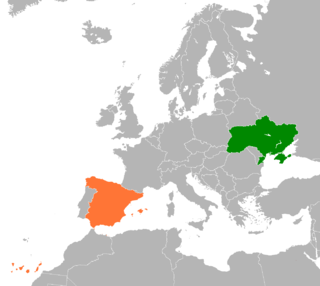
Relations between Spain and Ukraine were established in January 1992, some time after the Ukrainian independence. Spain is a member of the European Union, which Ukraine applied for in 2022. Both nations are members of the Council of Europe.

The Republic of Kiribati and the People's Republic of China (PRC) established diplomatic relations on June 25, 1980, and resumed on September 27, 2019. Between 2003 and 2019, The government of Kiribati recognized the Republic of China, and, in accordance with the "One China" policy, the People's Republic of China did not have diplomatic relations to the country.
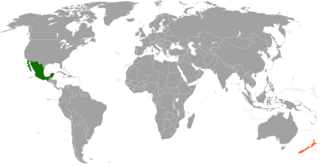
Mexico–New Zealand relations are the diplomatic relations between Mexico and New Zealand. Both nations are members of the Asia-Pacific Economic Cooperation, Comprehensive and Progressive Agreement for Trans-Pacific Partnership, Organisation for Economic Co-operation and Development, United Nations and the World Trade Organization.

Georgia–Spain relations are the bilateral and diplomatic relations between these two countries. Georgia has an embassy in Madrid. Spain is accredited to Georgia from its embassy in Ankara, Turkey and maintains an embassy office in Tbilisi. Georgia and Spain have shared the historical name "Iberia" in their territories: Iberia and the Kingdom of Iberia (Georgia). Spain is a member of the European Union, which Georgia applied for in 2022. Both nations are members of the Council of Europe.

Montenegro–Spain relations are the bilateral and diplomatic relations between these two countries. Both countries are full members of the Council of Europe, and of the NATO. Also Montenegro is an EU candidate and Spain is an EU member. Montenegro has an embassy in Madrid. Spain is accredited to Montenegro from its embassy in Belgrade, Serbia.

Czech Republic–Spain relations are the bilateral and diplomatic relations between these two countries. Relationships are mainly defined by the membership of both countries to the European Union and NATO. The Czech Republic has an embassy in Madrid and consulates in Barcelona, Benidorm, Bilbao, Oviedo, Palma de Mallorca and Santa Cruz de Tenerife. Spain has an embassy in Prague, as well as an Education Attaché, a Commercial Office and an Instituto Cervantes; the Delegation of Spanish Tourism for this country operates from Vienna.

Bilateral and diplomatic relations exist between The Bahamas and Spain. The Spanish embassy in Kingston, Jamaica, is accredited for Bahamas.

Marshall Islands–Spain relations are the bilateral and diplomatic relations between these two countries. The Spanish embassy in Manila, Philippines, is accredited for the Marshall Islands, plus Spain has an honorary consulate in Majuro. The Marshall Islands have an embassy in Madrid and a consulate in Barcelona.

Cambodia and Spain share bilateral and diplomatic relations. Cambodia does not have embassy in Spain, but the embassy in Paris is accredited for this country. There is no diplomatic delegation from Spain in Cambodia. The Spanish Embassy is located in Bangkok, Thailand.

Iran–Spain relations are the bilateral and diplomatic relations between these two countries. Iran has an embassy in Madrid, Spain has an embassy in Tehran.
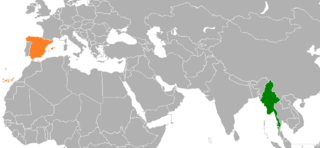
Myanmar–Spain relations are the bilateral and diplomatic relations between these two countries. Myanmar is accredited to Spain from its embassy in Paris, France. Spain has an embassy in Yangon.

Cape Verde–Spain relations are the bilateral and diplomatic relations between these two countries. Cape Verde has an embassy in Madrid, a consulate-general in Las Palmas de Gran Canaria and two consulates in Alicante and La Coruña. Spain has an embassy in Praia.

Democratic Republic of the Congo–Spain relations are the bilateral relations between the Democratic Republic of the Congo (DRC) and Spain. The Democratic Republic of the Congo has an embassy in Madrid. Spain has an embassy in Kinshasa.

Egypt–Spain relations are the bilateral and diplomatic relations between these two countries. Egypt has an embassy in Madrid. Spain has an embassy in Cairo. Both countries share a common framework in the context of the Union for the Mediterranean.
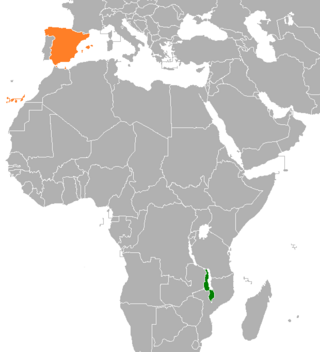
Malawi–Spain relations are the bilateral and diplomatic relations between these two countries. Malawi has an embassy in Madrid and a consulate in Barcelona. The Ministry of Foreign Affairs of Spain does not have representation in Lilongwe. The Spanish Embassy in Harare (Zimbabwe) is accredited to Malawi.

Nigeria–Spain relations are the bilateral and diplomatic relations between these two countries. Nigeria has an embassy in Madrid. Spain has an embassy in Abuja and a consulate-general in Lagos.

Spain–Sudan relations are the bilateral and diplomatic relations between these countries. Sudan has an embassy in Madrid. Spain has an embassy in Khartoum.

Micronesia–European Union relations are the foreign relations between the country of the Federated States of Micronesia and the European Union. Cooperation between Micronesia and European Union was initiated in 2000 when the country joined the Organisation of African, Caribbean and Pacific States and is developed in the framework of Cotonou Agreement within the wider ACP–EU development cooperation. Two sides formalized their direct diplomatic relations on 18 April 2002 when the European Union ambassador Frans Baan attended diplomatic credential ceremony in Palikir. In 2008 the designated national authorizing officer for EU programs Fabian Nimea visited several EU member countries to promote further cooperation between his country and the European Union.
